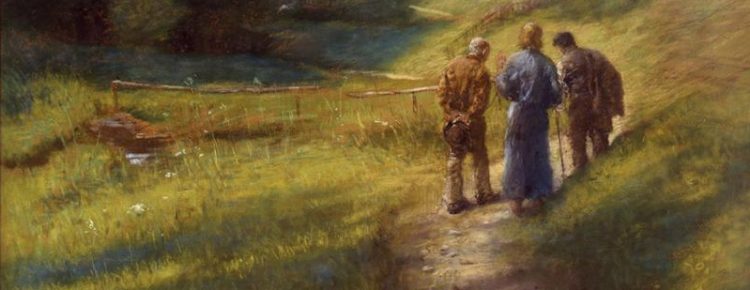The road to Emmaus – one of the best loved and familiar stories of the New Testament. Two friends, at a low ebb after their dreams and hopes of Jesus the Messiah had been shattered, suddenly have an encounter with him – he is risen indeed, Alleluia!
This encounter seems particularly important as it seems to have prompted the disciples to remember what Jesus had said at the Last Supper ‘Do this to remember me’. And we still do – week by week we break bread and remember Jesus. This word ‘remember’ is worth looking at – in the Greek anamnesis. It is a very dynamic word, not rendered well by our raher static ‘remember’ – which implies simply calling to mind something in the past. It might be better translated as ‘be remembering’ – this is a word which takes a past event and makes it alive in the present. The ‘remembering’ we do, in the Eucharist is vivid enough to be an encounter – when we share bread together, Jesus is here, with us.
We don’t need a theological debate about whether the bread actually becomes Jesus’ flesh and the wine, his blood. I think the presence of Jesus is more magnificent than that – a great mystery which is there before our very eyes, if we are willing to look, to see just as Cleopas and his friend suddenly ‘saw’ when their companion broke bread and revealed himself. This is Jesus’ trademark – he broke bread. Incidentally it is easy to miss this wonderful action in our Eucharists because we’re glued to our books – maybe you could try looking up when Michael or I break the bread – see if you can sense Jesus’ presence with us at this simple but wonderful moment.
An encounter requires something of us. There has to be an openness, an attitude of willingness, in order to encounter. If someone walks around with their eyes firmly closed, they’re unlikely to encounter the beauty of God’s world, although, sooner or later, they may trip over a bit of it. In our worship there has to be that same openness, willingness to encounter God, here with us. If we come with our spiritual shutters firmly drawn, an encounter with the divine is less likely – and woe betide us if we think we know it all, or that we’re above it all.
One of the things I love about the children here at St Oswald’s is their openness to encounter – I see this when they receive the bread and when they participate in our All Age activities – they approach these as places of encounter, not simply as things to be done. I wonder when we, as humans, begin to lose touch with this willingness to encounter? As adults, we need to nurture this necessary openness. It is a life changing thing, this willingness to see. The eighteenth century mystic, artist and poet, William Blake, put it like this:
To see a World in a Grain of Sand
And a Heaven in a Wild Flower,
Hold Infinity in the palm of your hand
And Eternity in an hour.
The implication of Blake’s poem (these lines are only the beginning), is that if we ‘see’, if we ‘encounter’, then good overcomes evil, and peace overcomes war. We may see this reflected in the recent chemical attack in Syria – whoever planned and executed this dreadful act must have stopped ‘seeing’ – so innocent children and loving parents are regarded as nothing, easy to get rid of, easy to eliminate.
So we lose willingness to encounter at our peril, for its loss brings narrowness, aridity and spiritual death, violence, deadliness. It’s loss is typified by those whom Jesus railed against – those deadly but devout people who thought they knew all there was to know, who had lost compassion and spent their lives disapproving of other people. This is the very opposite of the encounter we see in today’s Gospel – although sad and dispirited, these followers of Jesus still had that ability to be surprised – their spiritual shutters were not drawn down.
So, week by week, as we gather to break and share bread, we are challenged to encounter, challenged to life and love. We are challenged to find God in the simplest of things – a scar of bread, a shared cup, those who kneel alongside us to receive this divine mystery.
The silence I ask for, just before our worship begins, is meant as a time when we can focus. Here we can turn our inner selves to an attitude of readiness – a readiness to encounter God, here with us, a readiness to encounter love and life in the bread and wine, in each other.
When we leave the church building, we can carry this openness with us into our lives at home and at work. It can inform our attitudes and behaviour – it helps us to life life, rather than live death. It suggests love, rather than hate, charity rather than malice, life rather than death. So, encounter – today, are you open to this that God asks of us? In our our Eucharist today, let us be open to the wonders that God reveals to us in simple bread and wine. Amen

